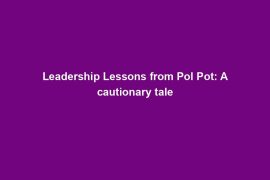Welcome to our latest blog post where we’ll be delving into the fascinating world of leadership lessons from Hun Sen. In case you’re not familiar, Hun Sen is the current Prime Minister of Cambodia, known for his unique and often controversial leadership style.
Studying Hun Sen’s leadership can provide us with valuable insights and lessons that are applicable to leaders in various fields. Whether you’re leading a team at work or trying to navigate the complexities of politics, there’s a lot we can learn from Hun Sen’s approach to leadership.
Throughout this post, we’ll be exploring key leadership lessons that can be gleaned from Hun Sen’s tenure as Prime Minister. From building strategic alliances to maintaining control through authoritarian tactics, there’s a lot to unpack when it comes to understanding his leadership style.
So, get ready to dive into the world of leadership with us as we uncover the valuable lessons to be learned from Hun Sen’s unique approach to leading a nation. Let’s get started!
Lesson 1: Consolidating power through building alliances and relationships
Hey there! Let’s dive into the first leadership lesson we can learn from Hun Sen – the importance of building alliances and relationships to consolidate power. Have you ever noticed how some leaders seem to have a solid support system behind them, while others are constantly battling internal conflicts? Well, Hun Sen is a prime example of a leader who knows the value of forming strategic alliances to maintain his political power.
Take a look at how Hun Sen has managed to stay in power for over three decades by building relationships with various groups within Cambodia. Whether it’s through partnerships with business leaders, political elites, or even members of the military, Hun Sen has ensured that he has a strong network of supporters backing him up at all times. This kind of strategic maneuvering has allowed him to solidify his position and effectively wield his influence.
Lesson 2: Maintaining control through authoritarian tactics
Now, onto our next lesson – the controversial use of authoritarian tactics to maintain control. Hun Sen has been criticized for his heavy-handed approach to governance, which includes tactics such as censorship, suppression of dissent, and cracking down on political opposition. While these methods may be effective in silencing critics and maintaining a semblance of order, they also come with their fair share of ethical considerations and potential pitfalls.
As leaders, it’s important to weigh the costs and benefits of using such authoritarian tactics. While they may yield short-term results in terms of control and stability, they can also breed resentment and undermine trust in the long run. It’s a delicate balancing act that leaders must navigate carefully to avoid alienating their followers and damaging their reputation.
Lesson 3: Adaptability and flexibility in leadership
Lastly, let’s talk about the importance of adaptability and flexibility in leadership, as demonstrated by Hun Sen. In the ever-changing political and economic landscape of Cambodia, Hun Sen has shown a remarkable ability to adapt to shifting circumstances and seize opportunities as they arise. Whether it’s navigating political crises or capitalizing on economic trends, Hun Sen has proven that flexibility is key to staying ahead in the game.
So, the next time you find yourself facing a challenging situation, remember to stay open to change and be ready to pivot your strategies accordingly. It’s this kind of adaptability that separates great leaders from the rest, allowing them to thrive in the face of adversity and uncertainty.
Stay tuned for the conclusion, where we’ll summarize these key leadership lessons and explore how they can be applied in various contexts. Until then, keep these insights in mind as you navigate your own leadership journey!
Conclusion
Wow, what a journey it has been exploring the leadership lessons we can learn from Hun Sen! Let’s take a moment to summarize all the key takeaways before we wrap up.
Summary of the key leadership lessons learned from Hun Sen
First and foremost, we saw how Hun Sen has been able to consolidate power through building alliances and relationships. By nurturing strong connections with various groups, he has maintained his political strength and influence in Cambodia.
Secondly, we delved into the realm of maintaining control through authoritarian tactics. While effective in some ways, we also learned about the potential pitfalls and ethical considerations that come with this style of leadership.
Lastly, we explored the importance of adaptability and flexibility in leadership. Hun Sen’s ability to adapt to changing circumstances in Cambodia serves as a valuable lesson for leaders to be open to change and seize opportunities as they arise.
Reflection on how these lessons can be applied in various leadership contexts
As we conclude our discussion, it’s clear that the lessons learned from Hun Sen can be applied in various leadership contexts beyond politics. Whether you’re leading a team in the workplace, a community organization, or even in your personal life, these insights can help you navigate challenges and inspire others to achieve great things.
Call to action for readers to reflect on their own leadership styles
So, I encourage you to take a moment to reflect on your own leadership style. Are you building strong relationships and alliances like Hun Sen? How do you approach maintaining control and authority in your leadership role? And most importantly, are you embracing adaptability and flexibility to navigate change and seize opportunities?
By considering these questions and implementing the valuable lessons learned from Hun Sen, you can take your leadership skills to the next level and inspire those around you to achieve greatness. I hope this journey has been enlightening for you, and I can’t wait to see how you apply these lessons in your own leadership journey. Remember, great leaders are always learning and evolving!

